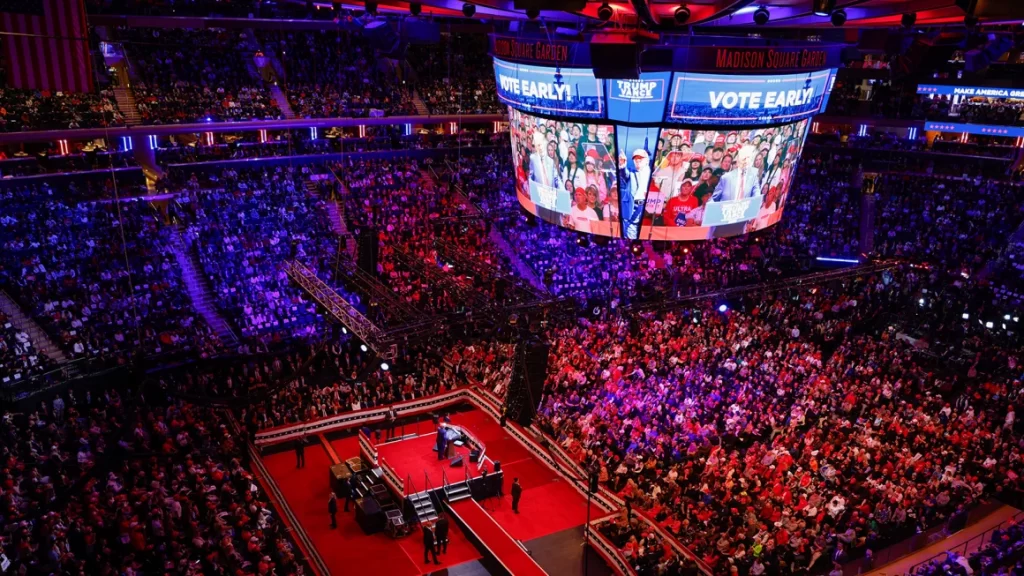The Implications of Trump’s Controversial Rally on Hispanic Voter Support
3 min read
Former President Donald Trump speaks at a campaign rally at Madison Square Garden in New York City on October 27, 2024. Anna Moneymaker/Getty Images

Former President Donald Trump speaks at a campaign rally at Madison Square Garden in New York City on October 27, 2024. Anna Moneymaker/Getty Images
Donald Trump’s recent rally at Madison Square Garden in New York City sparked significant controversy, particularly due to inflammatory comments made by speakers, most notably comedian Tony Hinchcliffe’s remarks about Puerto Rico. This incident is particularly striking given Trump’s recent gains among Hispanic voters, a demographic where he appears to be performing better than any GOP presidential nominee since George W. Bush in 2004.
Recent polling data indicates a narrowing gap between Kamala Harris and Trump among Hispanic voters, with Harris leading by just 13 points—substantially reduced from the 26-point advantage Joe Biden had in the 2020 election. This 2020 margin was an improvement for Trump, who had lost Hispanic voters by 39 points to Hillary Clinton in 2016.
The Trump campaign has recognized this shift and is actively working to build support among Hispanic voters. The former president held a significant rally in the heavily Hispanic Bronx earlier this year and made a recent visit to a local barbershop in the same borough. Trump’s increasing appeal among Hispanic voters is critical for his electoral strategy, particularly as Harris’s path to securing 270 electoral votes likely hinges on the Great Lakes battlegrounds of Michigan, Pennsylvania, and Wisconsin, where polling shows she is nearly tied with Trump.
In contrast, Trump is performing well in Arizona and Nevada, both key states with large Hispanic populations. Polls indicate he has a narrow advantage in Arizona, making it his strongest state among those won by Biden in 2020. Although polling data from Nevada is limited, it suggests a similar trend toward Trump compared to the Great Lakes states.
Notably, Trump’s support is particularly robust among Hispanic men and those without a college degree. However, the impact of the Madison Square Garden rally on this support remains uncertain. The rhetoric employed at the rally resembles that of Trump’s 2016 campaign, during which he struggled significantly with Hispanic voters.
While some may speculate about potential fallout from the rally, it’s essential to consider that most Hispanic voters are not from Puerto Rico, especially in critical battleground states. Moreover, Hispanic voters tend to prioritize a range of issues rather than singular topics. A recent New York Times/Siena College poll revealed that the economy is the top concern for Hispanic voters (29%), aligning with the broader electorate, where 27% identified the economy as their primary issue. Immigration ranks lower, with 15% of Hispanic voters indicating it as a significant concern, similar to the 12% among all likely voters.
On the flip side, the rally could potentially alienate non-Hispanic voters. Harris has been making historical inroads among White college-educated voters, a demographic that has shifted left since Trump’s rise, largely due to his rhetoric. These voters are particularly vital for Harris in suburban areas of Philadelphia, Detroit, and Madison, Wisconsin, where even slight shifts in support can be decisive.
While the Madison Square Garden rally brought significant attention to Trump, the focus seems largely negative. The resulting controversy may not bode well for his campaign. The Trump campaign likely prefers to be in the spotlight for positive reasons rather than being associated with divisive rhetoric that could backfire.
In conclusion, while Trump is experiencing an upswing in support among Hispanic voters, the implications of recent events, such as the Madison Square Garden rally, are complex. The long-term effects on his support in this demographic remain to be seen, especially as broader voter concerns continue to evolve.